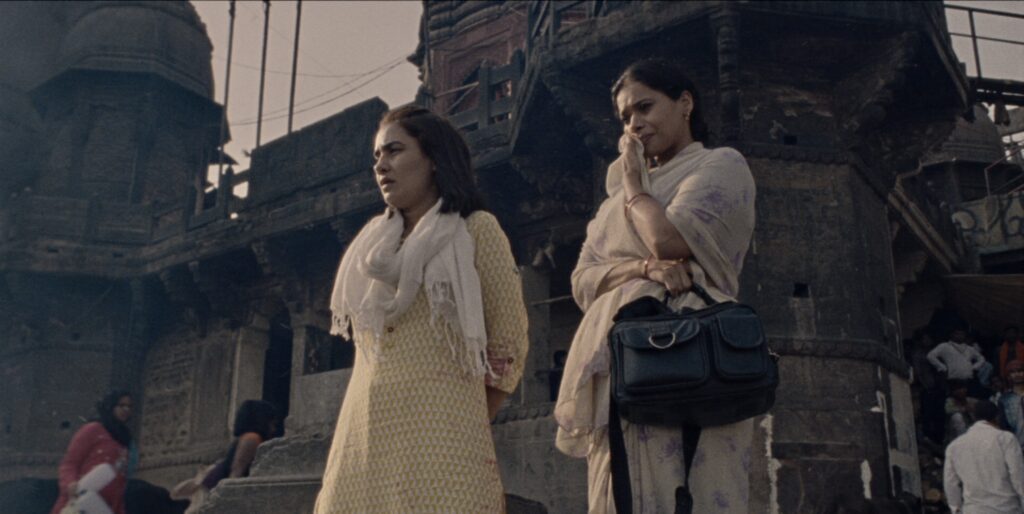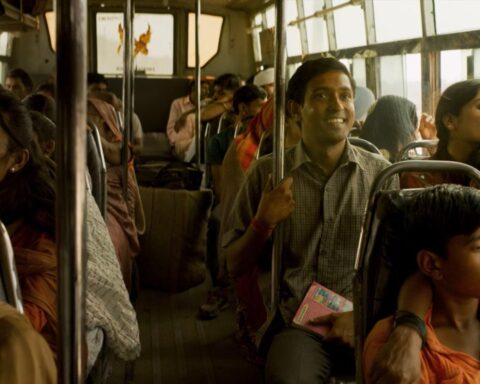Gaurav Madan’s critically acclaimed Barah by Barah (2024) has been released in theatres after making its rounds at various film festivals. It is set in the holy city of Benares, considered the focal point of the Hindu faith. People usually visit the ghats to undergo ceremonial tonsuring, seek absolution from sins, or culminate their cycle of birth, among other reasons. It is a place that displays the universal spectacle of life’s journey. Though such interplay between life and revelation remains at the narrative’s core, Barah by Barah is more about our collective inability to be with the moment and the world as it is. As a tale of a family caught between the crux and tradition, the film gives us a deeper understanding of the world. It is also about the fluctuating bonds and distances among family members. The film’s pace remains languid throughout its around two-hour run-time. It is a largely uneventful narrative that gains momentum through the lives lived by the characters and challenges us to examine ourselves or accept ourselves. It is as much a celebration of life as it is a meditation on the harsh realities of accepting modernity or sticking to one’s roots. The acting is top-notch, and the power of the perceptive writing brings searing honesty.
At the heart of the film lies Suraj (Gyanendra Tripathi), a young photographer who captures corpses brought to the ghats of Benaras for cremation. His father, Parbat (Harish Khanna), was a barber, and now he is suffering from ailments due to the consumption of tobacco. He refuses to go to the city of Delhi and get himself treated. He has accepted his fate and wants to breathe his last in his hometown. Suraj’s wife, Meena (Bhumika Dube), sews the clothes of the neighbor and the money she earns is saved for grey days. They are blessed with a son, Anshu (Prithvi Singh), who studies in school. As the days pass, Suraj realizes that he will not be able to sustain a living with his profession and needs to plan his future. His close friend Dubey (Aakash Sinha) supplies wood for the cremation and refuses to allow the demolition of his ancestral house by greedy constructors. Suraj also has a younger sister, Mansi (Geetika Vidya), who left home following a dispute with Parbat eight years ago. She works in the Delhi metro and will be married soon. One fine day, Parbat informs Suraj to call Mansi home as he wants to celebrate with his family this year.

Barah by Barah narrates a simple tale. The film eschews melodrama or any dramatic revelations. The screenplay of the film, co-written by Madan and Sunny Lahiri, who also serves as the cinematographer, creates a realistic drama with the quiet grace of everyday existence. Every seemingly simple act acts as a building block for the story. The screenplay ensures that every character has a function in the story and does not end up as mere fillers. Every person holds a tale within. Suraj struggles with choosing an alternate vacation to quench his creative thirst and earn enough to support his family. Dubey is seized with the conviction that he will be able to preserve his family heritage. Parbat is reticent, rigid, and unwavering in his demand for routine in life. Meena worries about her family but doesn’t let it appear on her face. Mansi is an independent woman who has not broken her ties with her family despite staying away from them. Suraj and Ansu sit silently on the stairs of the ghats as the announcement of a royal ride from Assi to Panchganga pier wafts in the air, heralding the intrusion of cosmopolitan culture in the region. After getting drunk, Dubey hugs the locked door of the house where he spent his childhood. A daughter’s sight of her dead father does not escalate from a slow-burning emotional moment to an intense melodrama. Through such fleeting moments, the film reveals its essence.
The technical aspects of the film raise the bar by notches and make it a cinematic storytelling experience. The cinematography by Sunny Lahri makes the city come alive in all its bygone splendor with an earthy tonality. The aerial shot of a corpse taken for cremation, with people playing Holi on either side and splashing colors illustrates that life itself is a passage leading to the inevitability of death. The composition gives death its due dignity and yet retains its objectivity. The editing by Hira Das is unhurried, and the scenes are slow-paced. The drama takes its time to involve us with the characters and their emotions. There are a few close-up shots of the characters’ faces to decipher what lies beneath the character’s calm veneer or what’s in their heads. But primarily, we observe their subtle expressions and body language from a distance, and piece together the complexities of their inner turmoil. The sound design by Vineet Vashishtha creates soundscapes that evoke the struggle of the subjects to negotiate themselves around their immediate environment. Dubey, after having a heated argument, dusts the seat of his bike off-screen, we hear sounds of old houses being demolished. We are unsure if this is going on in his mind or happening in reality. Thus, sound plays a crucial role in articulating the shifting dynamics of social space and also communicating the characters’ viewpoints. The production design by Naveen Lohara takes a minimalist approach that captures the milieu with an unerring sense of minute details. The evocative background score by Neil Mukherjee never feels invasive or disturbing.
The film is powered by its performances. Gyanendra Tripathi is riveting as Suraj. He makes the character’s frustration palpable as we watch him trapped in a profession that will be on the verge of extinction. He makes us root for his character as an individual who is not discouraged by obstacles. Aakash Sinha conveys the angst and grief of Dubey with restless energy and natural performance. Harish Khanna brings a deeper sense of emptiness and gnawing to Parbat. Bhumika Dube brings a melancholic stillness to Meena, and Geetika Vidya gives Mansi a charming and steely resolve.
Gaurav Madan makes an assured directing debut. He delivers a film that is ultimately heartbreaking and heartwarming in equal measure. The recreation of life in small-town India feels authentic, as do his characters. This indie film is uncompromised cinema and ends on a hopeful high note.




